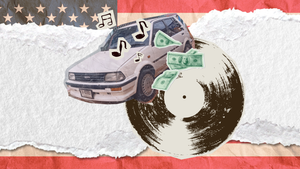Organisations representing the automotive and consumer tech sectors have joined with the music industry in calling on US Congress to introduce a radio royalty for sound recordings at the same time as considering a new law that would force American car manufacturers to include AM radios in every vehicle.
US copyright law is unusual in not providing artists and record labels with a royalty when recordings are broadcast on AM and FM radio, something the music industry has long been seeking to change.
The broadcasting sector seeking regulatory intervention that would ensure that traditional AM radio is still available in every American car has provided a good opportunity to put the decades long campaign calling for radio royalties in the US back into the spotlight.
“Mandating AM radio without addressing the performance royalty issue would perpetuate an inequity that denies hundreds of millions of dollars in compensation to countless recording artists every year”, says a new open letter to the judiciary committees of the US Senate and House Of Representatives.
Also, the letter continues, Congress should not overtly support and prop up a broadcast platform that “exploits artists by not paying them for their work”.
The letter is signed by an interesting group of lobbying organisations, with the Alliance For Automotive Innovation, the Zero Emission Transportation Association and the Consumer Technology Association joining with the MusicFirst Coalition in calling for a radio royalty to be added into US law alongside any mandate in support of AM broadcasts.
The automotive and consumer tech sectors have been critical of what is known as the AM Radio For Every Vehicle Act, which is strongly backed by the US radio sector’s main trade group, the National Association Of Broadcasters.
Meanwhile, the NAB is the most vocal opponent to the American Music Fairness Act, the latest proposals in Congress to introduce a radio royalty for sound recordings, which is strongly supported by the MusicFirst Coalition.
Which makes it feel like the alliance behind this open letter have sort of come together through the old proverb that “the enemy of my enemy is my friend”.
Though the Consumer Technology Association also includes satellite radio company Sirius XM in its membership, which has long complained that, under US copyright law, it does have to pay royalties to artists and labels while its AM/FM rivals do not. Which is another reason for supporting the music industry’s campaign.
These things are alluded to in the letter. “Satellite radio and streaming services, including some of our member companies, must compensate artists for their work”, it notes. “The lack of a performance right on terrestrial radio puts some of our member companies at a competitive disadvantage”.
Elsewhere it acknowledges that “some of our coalition members have concerns about the AM bill for a variety of reasons”. But if they can’t block the AM Radio For Every Vehicle Act in Congress - and it’s been looking increasingly likely that they can’t - then at least the radio companies who benefit from the AM radio mandate should pay royalties to the record industry.
“Our position is simply one of fairness and equity”, the letter states, before explaining “if you put in the hard work, you should be compensated”.
First introduced into Congress in 2023, and reintroduced earlier this year, the AM Radio For Every Vehicle Act would require the US Department Of Transportation to ensure that every “passenger vehicle” that is “manufactured in the United States for sale in the United States” or “imported into the United States” has, as standard, “devices that can receive signals and play content transmitted by AM stations”.
It follows moves by some in the automotive sector to stop putting AM radios into new cars by default, on the basis that people increasingly use satellite or internet services in their vehicles.
The proposal to keep AM radio in every car isn’t just about nostalgia for old fashioned crackly radio. It is partly about ensuring that the millions of people who do still listen to AM radio don’t suddenly lose access when they next upgrade their cars. But there’s also the argument that AM radio remains an important way for communicating safety information during extreme weather events and other emergency situations.
When re-introducing the AM radio proposals earlier this year, one of the act’s backers in Congress, Senator Edward J Markey, said, “As we witness more tragic climate change-induced disasters like the wildfires in Los Angeles, broadcast AM radio continues to be a critical tool for communication. AM radio is a lifeline for people across the country for news, sports and especially emergency information”.
“Tens of millions of listeners across the country have made clear that they want AM radio to remain in their vehicles”, he added, concluding, “Our AM Radio for Every Vehicle Act heeds their words and ensures that this essential tool doesn’t get lost on the dial”.

